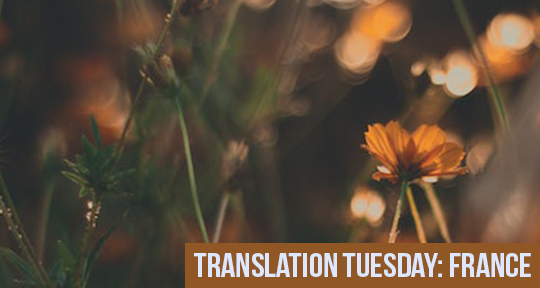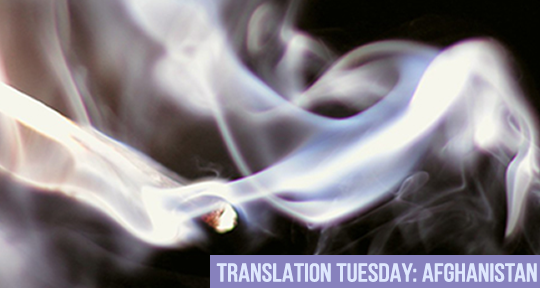This Translation Tuesday, we present a devotional sonnet of striking intimacy and palpable gratitude in praise of “this great God who fashioned me so well.” The brilliantly “fashioned” author in question is the 16th century French sonnetist, translator and nun, Anne de Marquets, whose own craftsmanship has been brought into a vivid and forceful English by Annick MacAskill. Her translation sees the very fibers of creation exhorted to sing the praises of their creator, and gives the ardor of de Marquet’s “amour divin” a strange intensity.
O sky and earth, and you, furious seas,
O fields and meadows adorned with blooms and trees,
In short, all things in this great universe,
Praise him, the one whom I love—
He who defeated inglorious Death,
Destroyed sin, and toppled Satan,
Who died through so many martyrs,
To grant me most fortunate redemption.
O such a singular and perfect reward
From this great God who fashioned me so well,
And who will make me as I wish it!
Would I not be incredibly ungrateful,
If I didn’t treasure him above all others—
Such a lover, a master, and father?
Translated from the French by Annick MacAskill
Anne de Marquets (1533?-1588) was a French poet, translator, and Dominican nun. Originally from Normandy, she spent most of her life in the priory of Poissy, where she produced translations of Latin poetry, as well as her own poems on spiritual themes. During her lifetime, several notable French authors, including Pierre de Ronsard (1524-1585), wrote poems praising her literary talents. Today, she is most famous for her posthumously published Sonets spirituels (Paris, Claude Morel, 1605), a suite of 480 sonnets organized around the liturgical year.
In 1568, Anne de Marquets published her Divines Poesies de Marc Antoine Flaminius (Paris, Nicolas Chesneau; reissued in a slightly expanded edition in 1569), a collection that presents not only her translations of verse by the Neo-Latin writer Flaminio (1498-1550), but original compositions by Marquets. These include her Sonets de l’amour divin, forty devotional sonnets that adapt the language and forms of Renaissance love poetry.
Annick MacAskill is a poet and translator living in Kjipuktuk (Halifax, Nova Scotia, Canada), on the traditional and unceded territory of the Mi’kmaq. She is the author of three full-length poetry collections, the most recent of which, Shadow Blight (Gaspereau Press, 2022), won Canada’s Governor General’s Award for English-Language Poetry. Her poems have appeared in journals across Canada and in the USA, the Netherlands, and Ireland, as well as in the Best Canadian Poetry anthology series.
MacAskill holds a PhD in French Literature from Western University, where she completed a thesis on the poet and translator Anne de Marquets, and has published several peer-reviewed articles on Marquets and other sixteenth-century French poets. She is currently translating Anne de Marquets’ Sonets de l’amour divin into English and teaching in the Department of Languages and Cultures at Saint Mary’s University in Halifax.
***
Read more from Translation Tuesdays on the Asymptote blog:


